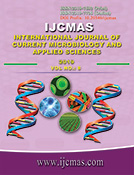


 National Academy of Agricultural Sciences (NAAS)
National Academy of Agricultural Sciences (NAAS)

|
PRINT ISSN : 2319-7692
Online ISSN : 2319-7706 Issues : 12 per year Publisher : Excellent Publishers Email : editorijcmas@gmail.com / submit@ijcmas.com Editor-in-chief: Dr.M.Prakash Index Copernicus ICV 2018: 95.39 NAAS RATING 2020: 5.38 |
A total of 200 SSR markers from different Brassica species were used in this study. Out of 200 SSR markers analyzed for polymorphism in two parental Brassica juncea genotypes (RB 50, drought tolerant and Kranti, drought susceptible), 51 were polymorphic. The polymorphic markers were used to screen F2 population. A total of 108 alleles were identified in the RB 50 and Kranti and the parental B. juncea genotypes. The PIC (polymorphic information content) values for various primers ranged from 0.340-0.505 with an average of 0.406. Similarity coefficient data based on the proportion of shared alleles using 51 SSR markers was used to calculate the coefficient values among the 157 F2 plants of RB 50 × Kranti and parental B. juncea genotypes and subjected to UPGMA tree cluster analysis. All the 157 F2 plants clustered in two major groups at the similarity coefficient of 0.53. Two parental varieties RB 50 and Kranti had low similarity coefficient. Genetic relationship was also assessed by PCA analysis (NTSYS-PC). Two dimensional and three dimensional PCA scaling exhibited that two parental genotypes were quite distinct whereas all 157 F2 plants interspersed between the two parental lines with distribution of most plants towards RB 50.
 |
 |
 |
 |
 |